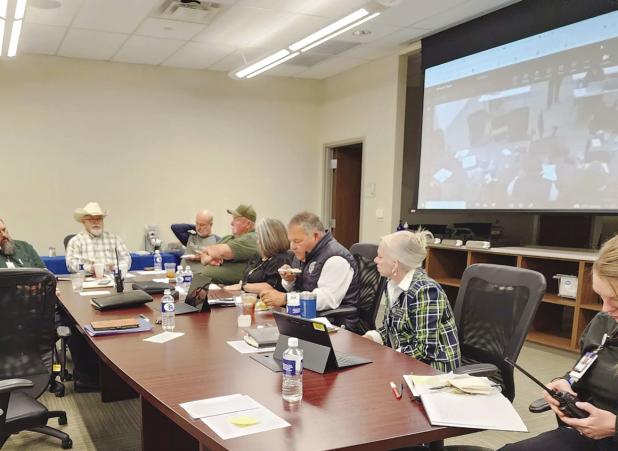
Young, Jack counties fine-tune mental health goals
JACKSBORO - Young and Jack County community leaders met in Jacksboro on March 29 to fine-tune a plan to plug gaps in the state’s mental health services for rural residents and discuss strategies for funding those urgently needed services with grants or by finding room in tight local budgets if promised help from the Legislature does not materialize.
“We know a lot of our consumers already,” Olney Police Chief Dan Birbeck said. “There are a lot of people who are managing just fine but it’s the ones who are struggling … with substance abuse coupled with mental health problems. If we are putting the effort in, I think we will see the reward …I can think of three suicides that could have been prevented if somebody knew there was someone who had care and compassion for them.”
The two rural counties, which count fewer than 30,000 residents in a 1,800-square-mile area between them, have been working together for months to remedy a service desert that resulted in three deaths in Olney in the last year alone and lengthy jail detentions at Young County Jail of people suffering from severe mental illness.
The situation worsened during the COVID-19 pandemic and shutdown when North Texas State Hospital limited admissions to people from Wichita County, although the facility is supposed to serve a 19-county catchment area that includes Young and Jack counties.
At a workshop led by the Texas Judicial Commission on Mental Health last month in Decatur, leaders from the two counties came up with a three-part plan to offer mental health services tailored to the vast distances to state-run mental hospitals, limited police manpower, and small-town dynamics, and submitted a $1.35 million funding request for a mobile mental health team to the House and Senate Health and Human Services Committees.
If approved by the Legislature, the money would fund a mobile mental health unit composed of a law enforcement officer, an emergency medical technician, a social worker, and a peer counselor that would serve people with ongoing mental health needs and respond to crises in both counties for two years.
“I don’t know of any rural mobile crisis teams like this,” Chief Birbeck told the group. “I think in a lot of respects we will be paving the way for other rural mental health response teams. We can adjust and develop policies as we go.”
Young County Sheriff Travis Babcock agreed: “We have to have the teams out there to talk to these people because I’ve seen it work,” he said.
Work is underway to convert the Jack County Jail into a mental health facility that will treat inmates and people in crisis from both counties to return them to competency when no bed is available at the state-run hospitals, Jack County Judge Keith Umphress said.
“These county jails are unstaffed and so the solution has to be found,” Sheriff Babcock said. “We have a bad need in the jails.”
The group also discussed its third initiative - education – and planned to set up community workshops through Helen Farabee Centers for first responders and others who deal with people with mental health issues to recognize warning signs of crises and to find appropriate services.
The group, which also included Young County Commissioner Stacey Rogers, Licensed Clinical Social Worker Mona Bernhardt of Olney, Jacksboro Police Chief Scott Haynes, Jack County Chief Deputy Chris Reger, and Jack County Commissioner Gary Oliver, also explored alternative funding plans if the state does not pony up funds to extend mental health care to rural Texas this year. Those alternative plans could include tapping state and private grants, using leftover federal COVID dollars, or establishing a ¼-cent municipal tax to fund a Crime Control Prevention District.
Following the Jacksboro meeting, Chief Birbeck met with executives at Red River Hospital in Wichita Falls to discuss how Olney Police and other law enforcement agencies can get access to psychiatrists and beds when they pick up citizens who need mental health evaluations or treatment.
“I think it was a very productive meeting,” Chief Birbeck said. “They were very open to working with us and addressing our mental health consumers’ needs and I’m looking forward to working with them more as we expanded access to mental health services for people in rural communities.”
